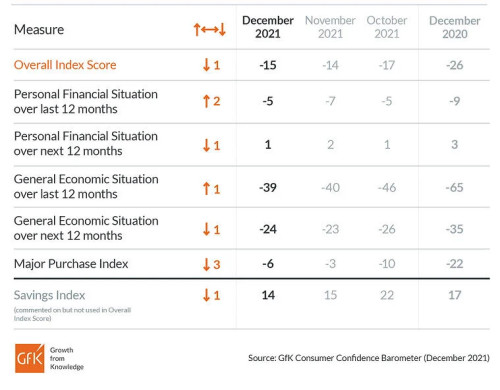Retail sales rose by 1.4% in November after non-food retailers benefitted from increased demand stoked by Black Friday promotions and consumers buying Christmas gifts early amid warnings of product shortages.
The rise from the previous month was faster than analysts had expected, with the Office for National Statistics (ONS) highlighting that sales volumes were 7.2% above pre-pandemic levels in February 2020.
Non-food stores sales volumes rose by 2.0%, whilst food store sales slipped 0.2%.
“Retail sales picked up in November, boosted by strong Black Friday and pre-Christmas trading,” said Heather Bovill, deputy director for surveys and economic indicators at the ONS.
“Clothing stores fared particularly well and have exceeded their pre-pandemic level for the first time. Computer, toy, and jewellery retailers also reported robust sales this month.”
With more people choosing to visit high streets and retail parks, the ONS data confirmed that shopping online had further weakened from the heights of the pandemic. The proportion of retail sales online fell to 26.9% in November, its lowest proportion since March 2020 and a continuation of a falling trend since its peak at 36.8% in February 2021.
However, the spread of the Omicron Covid-19 variant and return of face coverings in shops is expected to result in a switch back to online shopping in the weeks ahead.
Bethany Beckett, an economist at consultancy Capital Economics, said November’s strong overall growth in retail sales felt a bit like a “consolation prize” for retailers who now faced a difficult Christmas. She suggested that early gift-buying probably meant some spending had simply been shifted forwards, and even if people turned to online shopping as going out became risky, it was “hard to see the risk of tighter restrictions and reduced overall activity as a positive”.
Paul Martin, UK head of retail at KPMG, added: “December could paint a different picture for the sector, due to Covid restrictions and concern over rising infection numbers. Retailers will be hoping the rollout of the vaccine booster programme continues to bolster consumer confidence as we head into 2022, against a backdrop of rising interest rates and inflation, which could see the party come to an end and consumers pull back spending as they look to weather the storm and rising household costs.”
Separate consumer confidence data published today suggested that people’s view of the economic outlook and their personal finances had already darkened over the past month and was now much more negative than during the summer reopening.
GfK’s Consumer Confidence Index decreased one point to -15 in December, with two measures up, and three down in comparison to last month’s announcement.

Joe Staton, Client Strategy Director at GfK, commented: “News about the Omicron variant could not have arrived at a worse time for festive celebrations. As thoughts began turning to Christmas and the New Year, Omicron jumped out of nowhere and threatened to bring Santa’s sleigh crashing to a halt.
“While the holiday season has not yet been hijacked, December’s headline score has slipped one point to -15 and the lack of Yuletide cheer is evident.
“Both measures that look at how people see the coming year have slipped – down one point for personal finances over the next 12 months and down one point for the wider economy during 2022. This is driven by concerns over the soaring cost of living with the prospect of looming interest rate rises piling on more pressure. And dispirited Brits say they are less inclined to make major purchases during the countdown to Christmas.
“We end 2021 on a slightly depressed note and it looks like it will be a bleak midwinter for UK consumer confidence possibly with new Covid curbs and little likelihood of any real uplift in the first months of 2022.”



